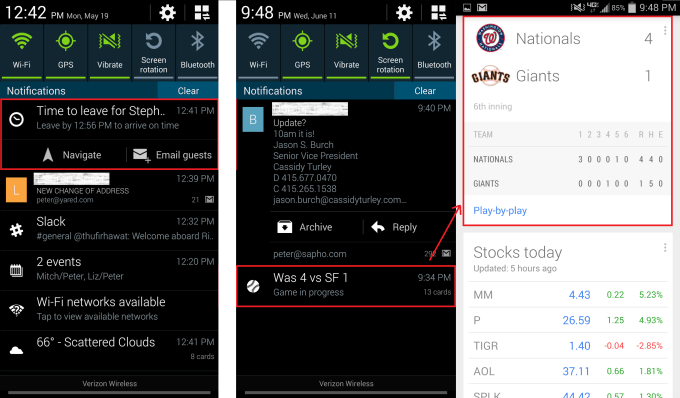 Blog
Blog
Back to Blog
Google’s Push Past Search

Google’s answer to solve the ‘search’ problem on mobile. In short, traditional search (pull method) is not working on mobile. So Google is moving towards content curation based on context, using highly sophisticated algorithms and extensive machine learning (based on information we inadvertently give up about ourselves when using google products) to predict what a user may want to know and give it to them before they ask for it (push method).
- Answer Attempt No. 1 – Notify you that something important is happening before you even ask: using Google Now cards. This feature has initially focused around calendar appointments and location, with more recent additions such as sports scores for teams you follow. When you have an upcoming calendar appointment, Google Now checks travel routes and notifies you when you should leave in order to arrive at the appointment on time.
- As Google Now learns what you are interested in, this notification feature will likely incorporate big stock swings in your portfolio, major news events of interest to you and important emails from your boss.
- Answer Attempt No. 2 – Show you things you might search for before you even search. Google wants its users to form habits around its Google Now cards as much as possible. When you type a Google search on a mobile Android device, Google automatically pushes the Google Now stream, which attempts to predict what you might be searching for by showing a stream of updates to websites that you have recently visited, new content for search terms you have searched, real world events such as a new episode of a television show whose website you have visited, and nearby places in case you are looking for a café or a restaurant.
- Google uses your search history and profile information to build the cards, so the cards are generally very relevant.
- Answer Attempt No. 3 – Answer your query with an answer box. If Google fails at answering what you want with a push notification or its predictive stream of cards, it still shows you a card above the search results.
- Answer Attempt No. 4 – Show the search results that we once loved and now disdain on mobile. Yes, Google’s organic search, which we have known and loved since the late nineties, is now a failure condition of a failure condition of a failure condition.
- The shift away from showing organic search results on mobile devices will have a profound effect on websites that rely on Google for traffic
- Google is the stalwart of Web 1.0 and Web 2.0 “Pull Computing,” with interaction hinged around a user deciding to search for something and sifting through results and advertising. Google is now reinventing itself on mobile with a “Push Computing” paradigm. Push Computing, where server computers curate and organize content to send to a client, is the backbone of successful mobile companies.
(source)
